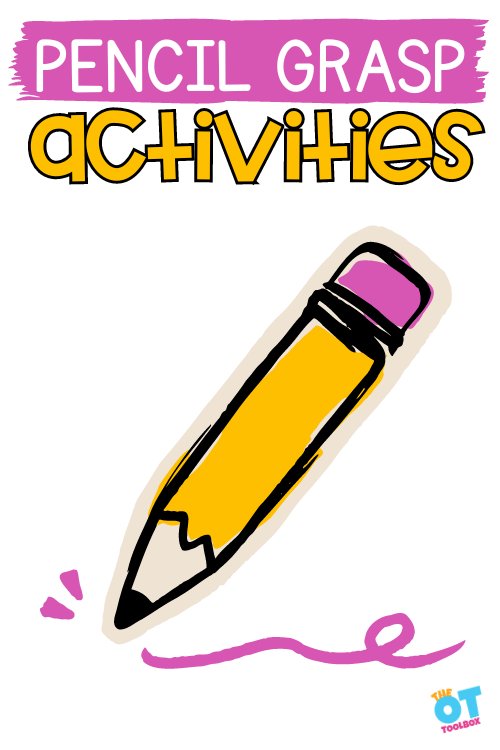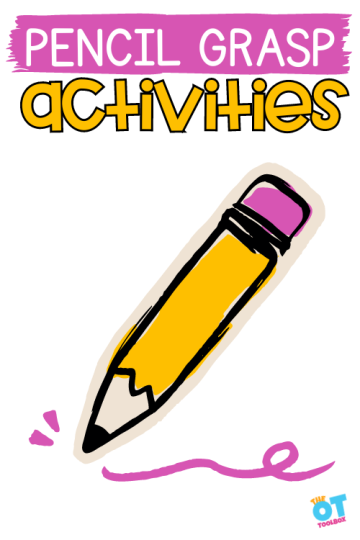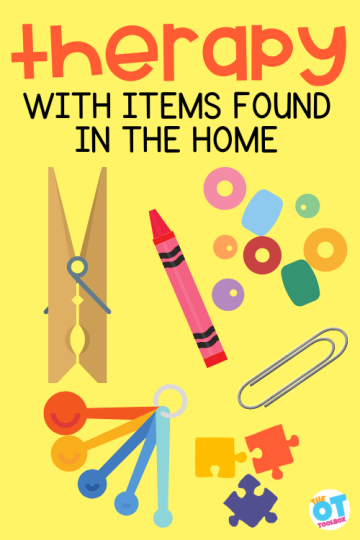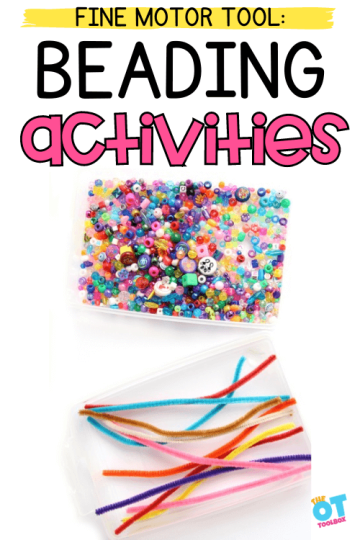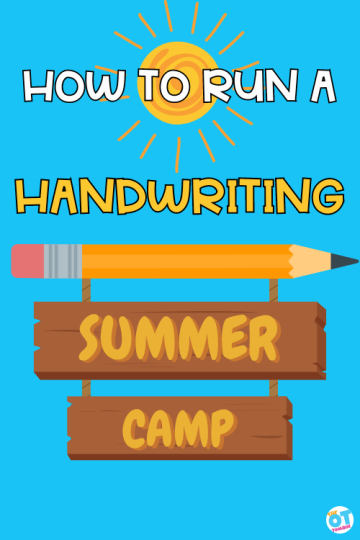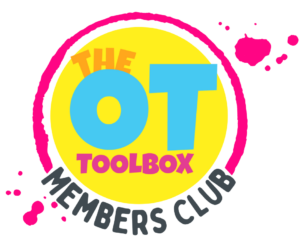Did you ever stop and think about the power of play? There are so many ways child development progresses through every day play. We know as occupational therapists that play is the primary work of the child, but it is also through play that essential skills are developed and refined.
Play Development
We’ve covered the development of play in various places across this website, breaking areas down by age:
As well as play activities by skill area:
- Fine motor play ideas
- Gross motor play ideas
- Sensory play ideas
- Visual motor play ideas
- And many more!
From independent play to parallel play to organized games, play exists along a continuum that development can exist at various ages.
The Power of Play
Play is the essence of childhood and it’s the means for children to develop and grow! The incredible power of play is a tool and a means to children development.
It’s through play that kids learn. Kids delight in games, toys, and creative play while developing skills like fine and gross motor development. They learn to self-regulate. They learn to communicate, manage their emotions, and gain valuable sensory input. Play is powerful for kids!
Let’s go over the importance of children’s play…
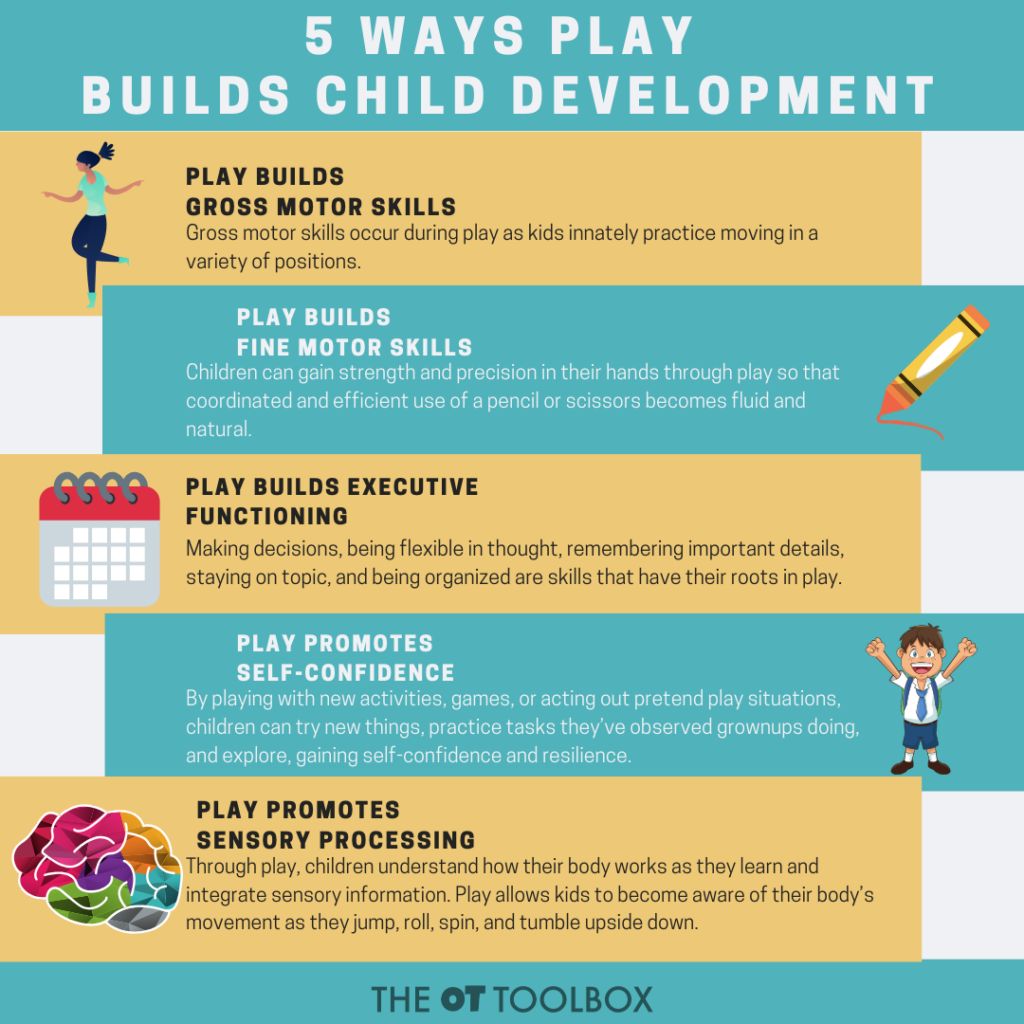
The Power of Play
Not long ago, I was asked by Radio Flyer to represent occupational therapy as an Expert Play Panelist. Such fun! As occupational therapists, we KNOW the power of play. We KNOW that kids need to move, climb, run, and experience all of their senses in order to grow and develop. Play is the means. Play is very simply, what kids do. It’s their job to play, and play is the way they develop skills they need throughout their life.
Play is powerful!
You can read the blog post over at Radio Flyer that describes the impact that play has on child development.
In that blog post, I discussed the power of play on fine motor skills, gross motor skills, self-confidence, sensory processing, and executive functioning skills. All of these areas (and more!) areas by play.
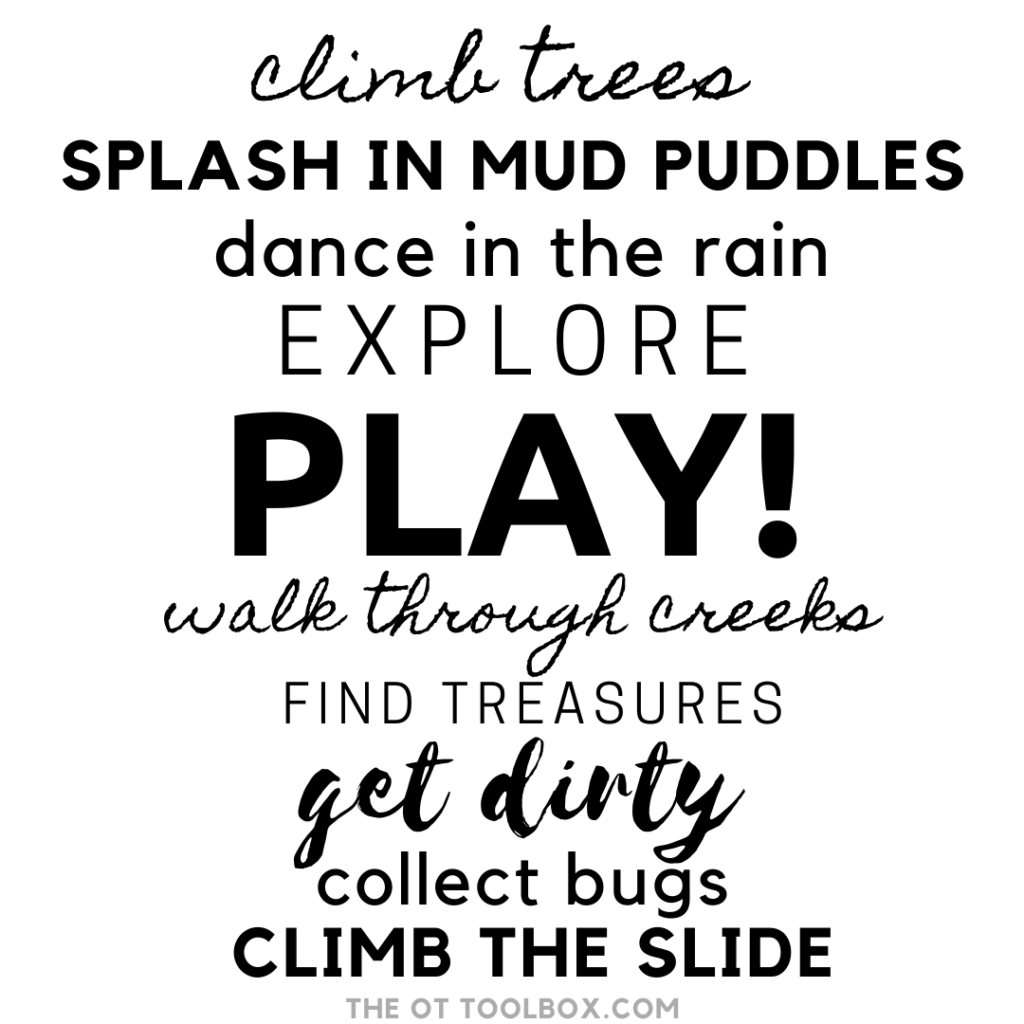
Play is a learning tool. Play-based learning is one way that children can learn valuable lessons through play, however it’s more than that. It’s through play that children learn about the world around them.
Kids learn how things work, move, and interact through play. Movement-based learning offers kids an opportunity to learn through gross and fine motor activities, but while they are moving, they are learning how their body works, too. They develop motor skills at the same time.
Play Development
Here’s the thing. Children develop play skills as they grow. But play also develops skills! It’s a win-win situation.
Play Develops Gross Motor Skills
Gross motor skills occur during play as kids innately practice moving in a variety of positions. Gross motor coordination, balance development, endurance, motor planning, proximal stability, and visual motor skills are all developed through play.
Whole body movements begin to develop from birth, through tummy time and play supports that. But as a baby begins to explore the world around them, they crawl, stand, and walk and all of this is rooted in play. These early gross motor milestones support development of later skills, too.
Play Develops Fine Motor Skills
Play develops fine motor skills through tool use, manipulating toys and pretend materials, and engaging in play activities. Take a look at this fine motor milestones list and see how many of the developmental milestones are rooted in play and exploration of the world using the hands and fingers.
Children can gain strength and precision in their hands through play so that coordinated and efficient use of a pencil or scissors becomes fluid and natural.
Play develops core strength and stability, refined precision skills, and endurance in the hands for managing clothing fasteners and other everyday items.
Play Develops Executive Functioning
By playing with new activities, games, or acting out pretend play situations, children can try new things, practice tasks they’ve observed grownups doing, and explore, gaining self-confidence and resilience.
Play offers experiences for developing executive functioning skills such as:
- impulse control
- coping skills
- organization
- problem solving
- attention
- planning and prioritization
- task completion
- working memory
Play is a way to practice jobs, too. Think about the child that plays house, construction worker, race car driver, or shopping. All of these occupations require executive functioning skills to plan the activity, carry out tasks, and complete the play sequence. This pretend play is a huge role in development of skills.
Play Develops Sensory Processing
Through play, children understand how their body works as they learn and integrate sensory information.
Dr. A. Jean Ayres, an occupational therapist, psychologist, and neuroscientist, developed her Ayres sensory integration theory and practice in the mid 1970s. She recognized that a child’s sensory system can greatly impact how they perceive and interact with the world around them, through play.
Play allows kids to become aware of their body awareness and body movement as they jump, roll, spin, and tumble upside down.
Play that offers a variety of movements and heavy work opportunities offer proprioceptive and vestibular input that impacts self-regulation. These sensory systems, through play are related to interoception, or internal awareness of the body’s functions.
Play also develops the visual motor system as children move through space and coordinate hand and eye information.
Play Develops Self-Confidence
By playing with new activities, games, or acting out pretend play situations, children can try new things, practice tasks they’ve observed grownups doing, and explore, gaining self-confidence and resilience.
Self-confidence allows us to try new things.
And trying new things (and trying the hard things!) is important for kids.
Self-confidence is an aspect of emotional intelligence. It’s part of social emotional skills that allow us to participate in tasks, interact with others, understand and recognize emotions, and essentially function!
All of these areas: motor skills, cognitive skills, social emotional skills, sensory processing skills…they are all founded in childhood, established at a young age through the very fun occupation of PLAY! What’s cool is we are lead as humans to do meaningful and motivating tasks, and play is just that! It makes us WANT to participate so we can learn and develop!
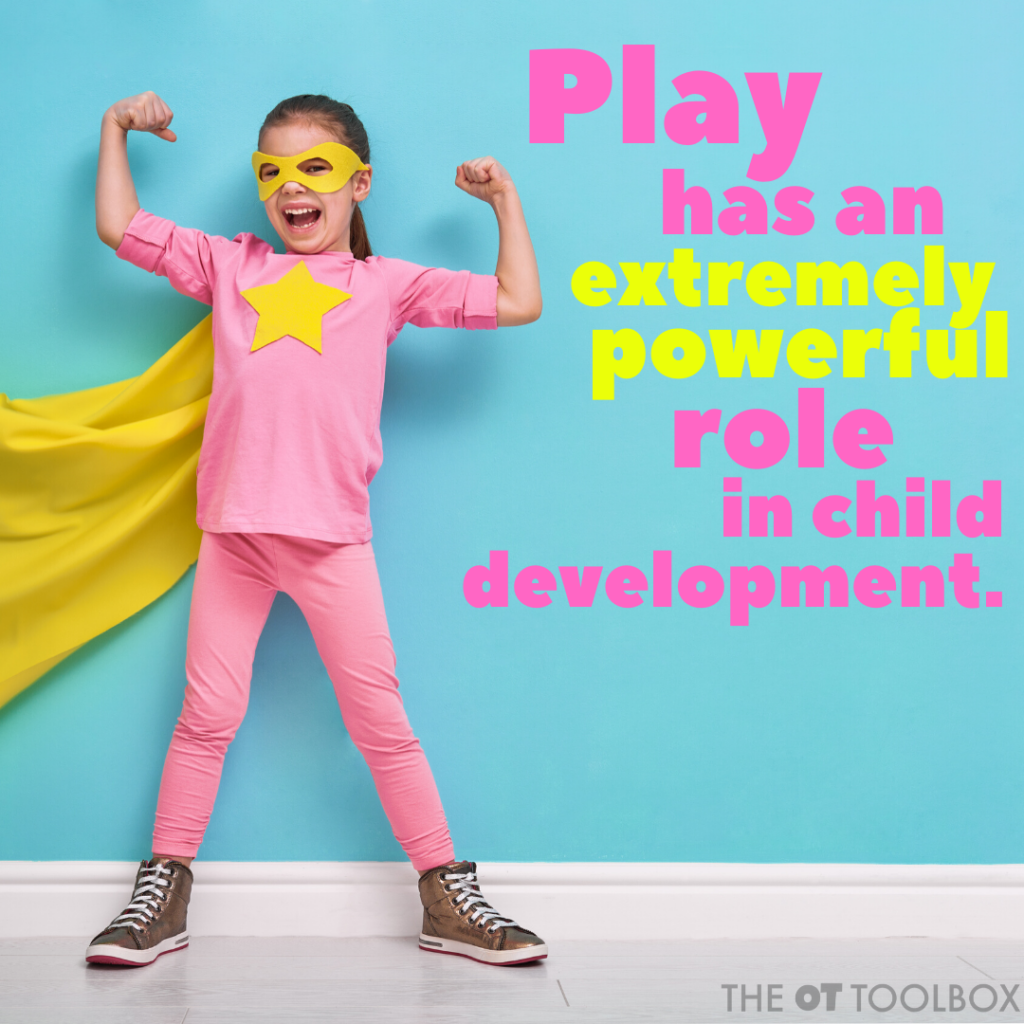
The Role of Play in Child Development
Ok, you might be thinking, “Right. Kids play. That’s nothing new.”
And you’re right. Play is so natural. Some of your earliest and best memories may be of play situations in your own childhood. Play happens instinctively. But the thing is that play is suffering in kids. If you’re in an educational setting or an occupational therapist, you might be nodding your head right now. Kids are different than they were in the past. And play is at the root, once again.
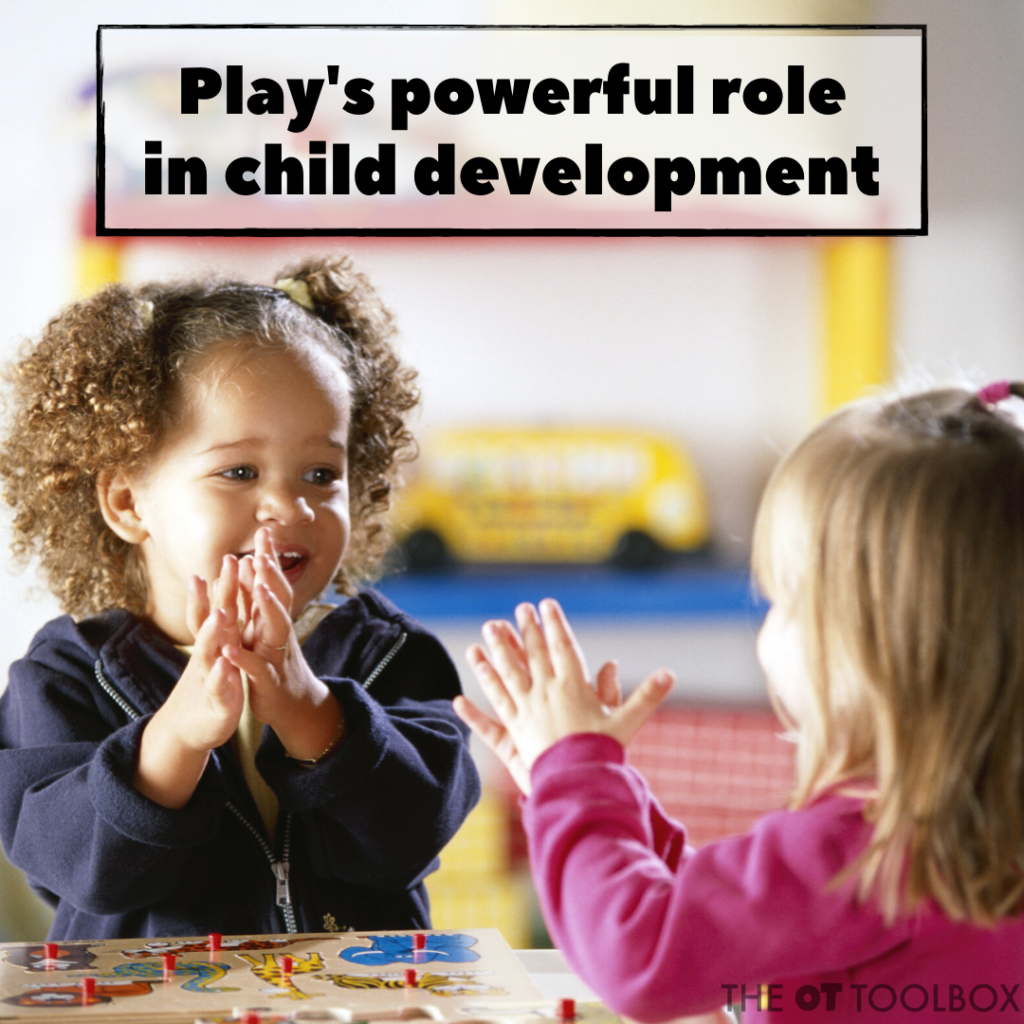
But Play has Changed.
Times change. We know this. Technology advances, knowledge progresses, and the world transforms. However, play being the root of child development, learning, and pediatric skill acquisition doesn’t change.
Here are a few ways that play has changed and how that may look in kids today:
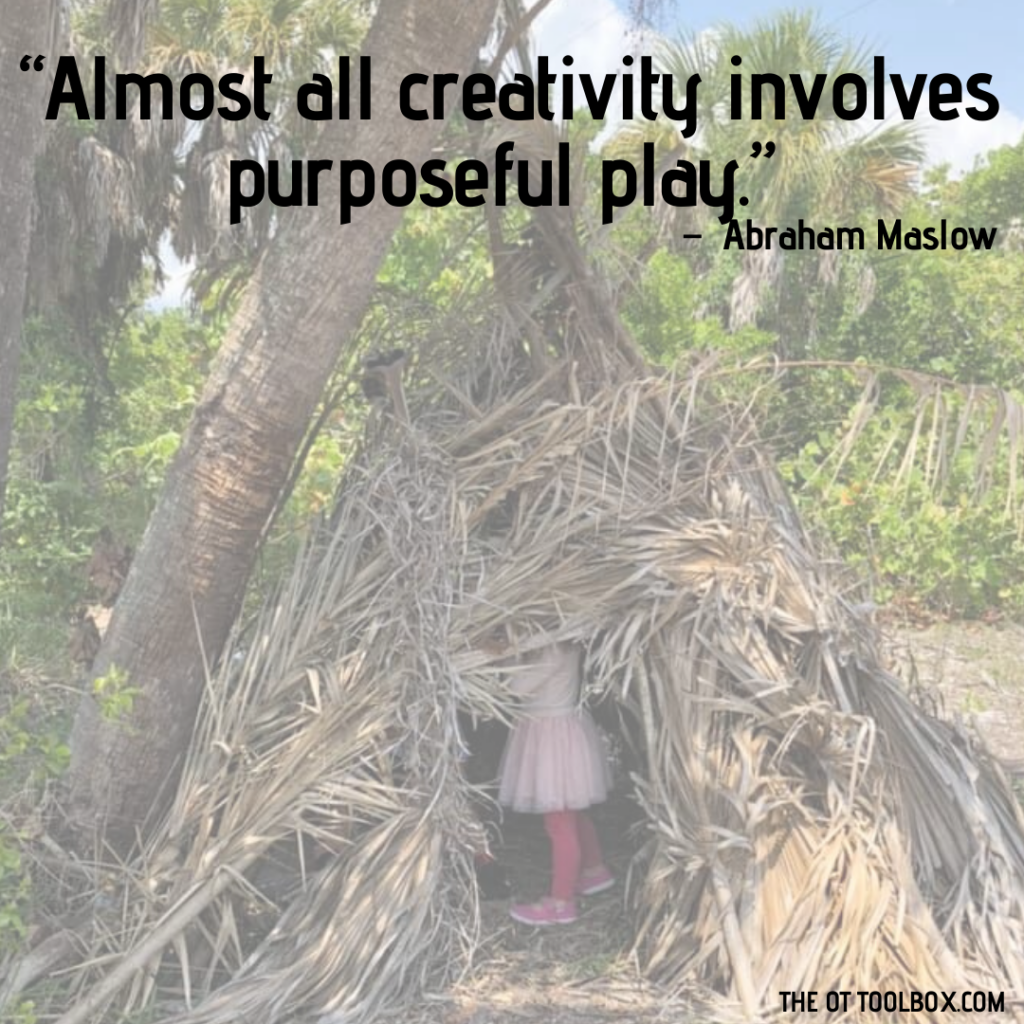
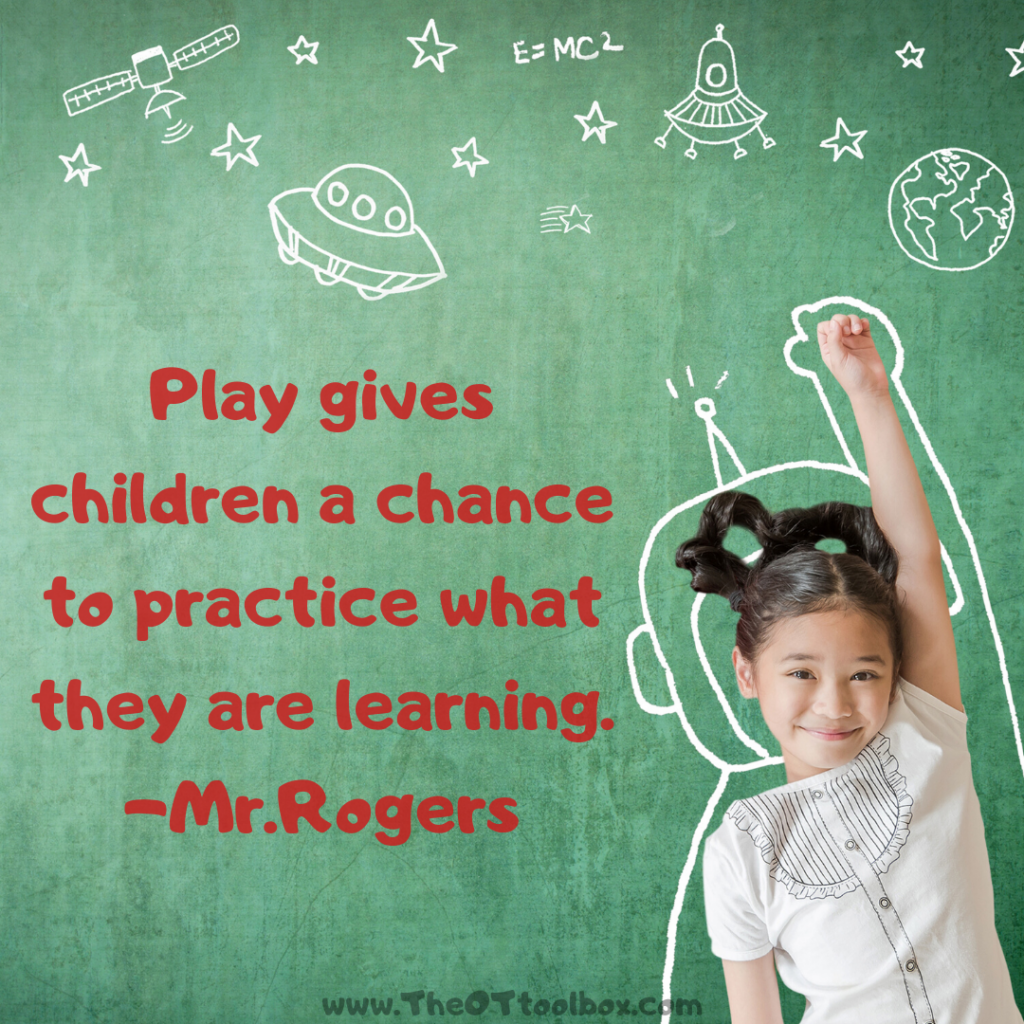
Less Time for Kids in Nature
Kids spend less time outdoors- Do you remember playing outdoors for the entire day and coming home when the streetlights came on? Kids are spending more time indoors. After school hours aren’t spent outdoors or in free-play. They are spent indoors, at child care centers, or after-school programs. Sometimes, it’s the fact that kids need to complete their homework so they can dart off to sports practices or appointments. Other times, it’s not safe for children to play outside in the yard on their own. Kids miss out on the free running space, climbing, running, rolling, and motor development.
Kids are spending more time in the car, running back and forth to organized activities- There are wonderful benefits to spending time on a team or learning an instrument.
However, for children now, they are a member of several sports teams, participating in various activities, clubs, and other organized activities. Sports teams sometimes have more than one practice or game per week. Kids are being run to and from sports practices, instrument lessons, clubs, appointments, and more. All of that time spent in the car limits free and creative play.
This isn’t’ to say that sports and clubs aren’t good for kids! It’s just a point of awareness that time spent in these organized tasks limits free play, outdoor experiences, and growth in learning through the senses and motor experiences.
There are so many benefits to nature play!
Less recess time- Are you seeing this too? Kids in my district are limited in outdoor recess time by the weather. So, when it’s cold or raining, they don’t get to go outdoors to play. And that lack of monkey bar time at recess can be an issue with the afternoon learning. Students in the older grades don’t even get recess in our district.
From grades 4-6, there is a limited time for recess. In fact, recess and lunch time is shared. So if children need extra time to eat, they miss out on recess. Not cool for our kids that are “big kids”!
Kids need that outdoor play.
Are you seeing less recess time at your schools?
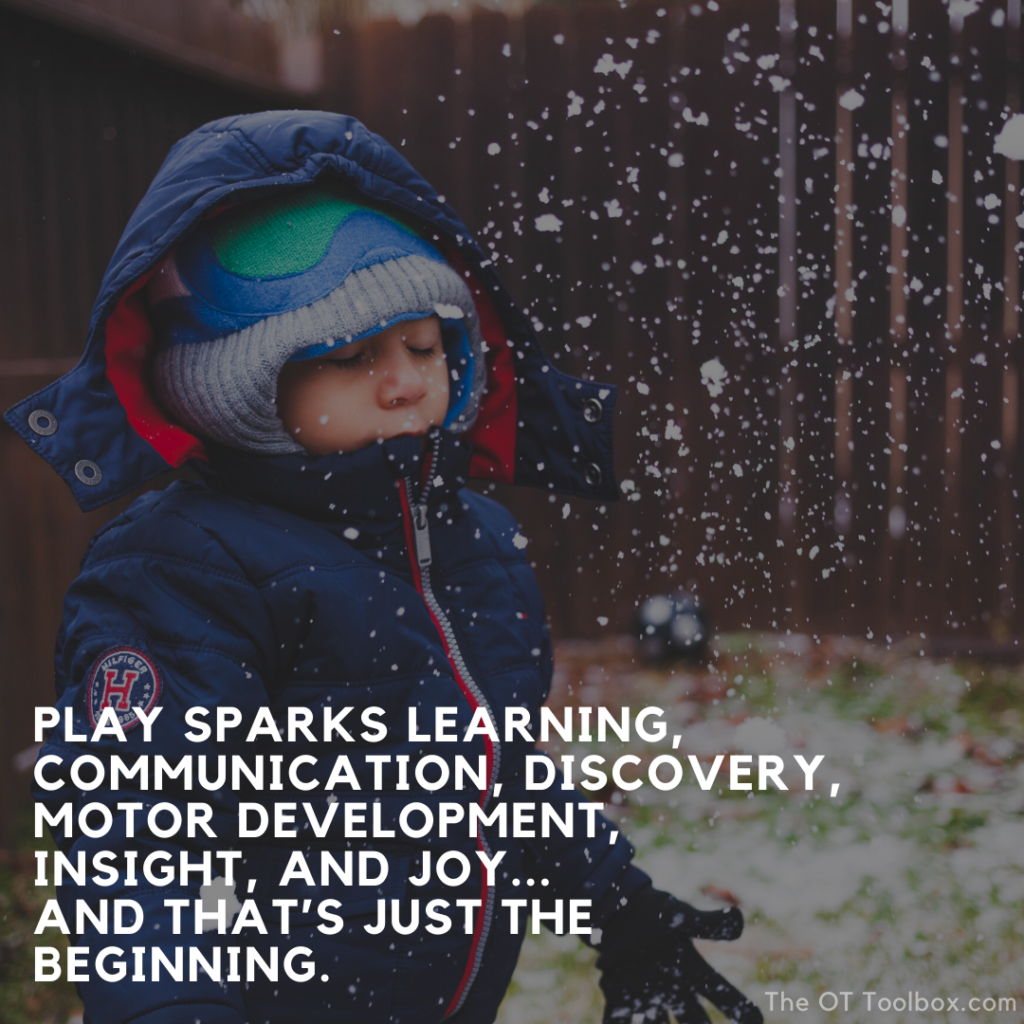
Kids are spending more time on technology- The screens are taking over! So often, a child has a phone or tablet screen in front of them rather than spending time playing games, playing with friends, they are playing digital games or watching videos. They are limiting themselves in motor and sensory experiences. Movement and creative play are impacted.
Don’t take this the wrong way: Technology is awesome! It’s a way of life. We are lucky to be alive during this time of knowledge and awareness granted by technological advancements. Kids can learn from devices…some of them know more about technology than their adults. The point is that being aware of time spent in a head-down position holding that phone limits interaction with the world around them. Awareness of this time is key.
There are more changes that we’ve been seeing in kids today. This is just a short list but one to be aware of as practitioners, parents, and teachers. As the adults in the room, we need to make the change that kids need.
We need to be vigilant in making play available to kids…the power of play is essential to child development!
We need to guide children to play.
Because, the organized sports and scheduled activities are fun. It’s fun to play on a team with friends. It’s easy to fall into the day-to-day-life that daily schedules require. It’s fun and exciting to watch YouTube videos and play games with friends online.
It’s our job as parents, teachers, therapists…adults to see the impact these life changes are having on our kids.
Our kids deserve it!
Learning Through Play Quotes
In this blog post, we covered more than just the power of play. You’ll also fine learning through play quotes and memes about play. These quotes about play are just one way to advocate on the power of play.
I’m sharing great social media graphics about play that you can share online. These are importance of sensory play quotes, quotes about play, and play development memes. (Just link to this page as your source!) I’m also talking about the incredible benefits of play in kids.
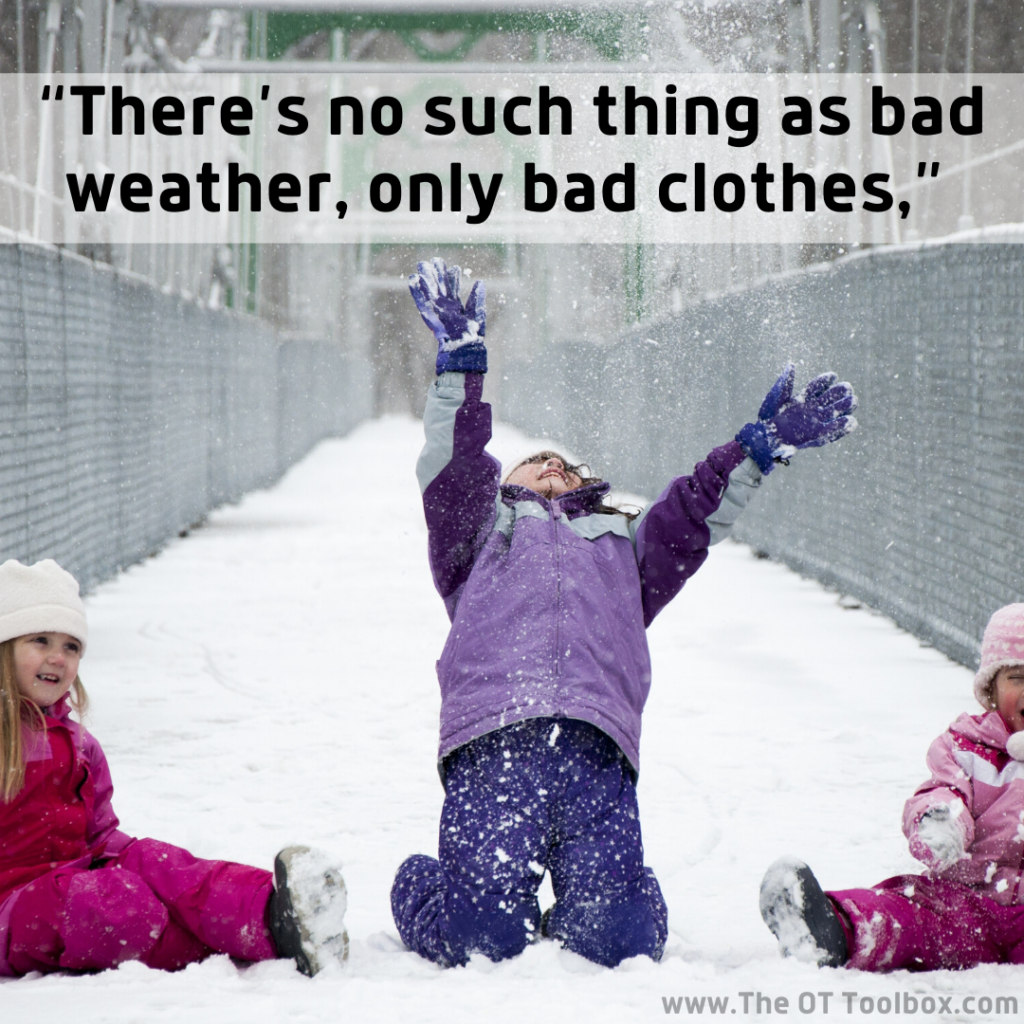
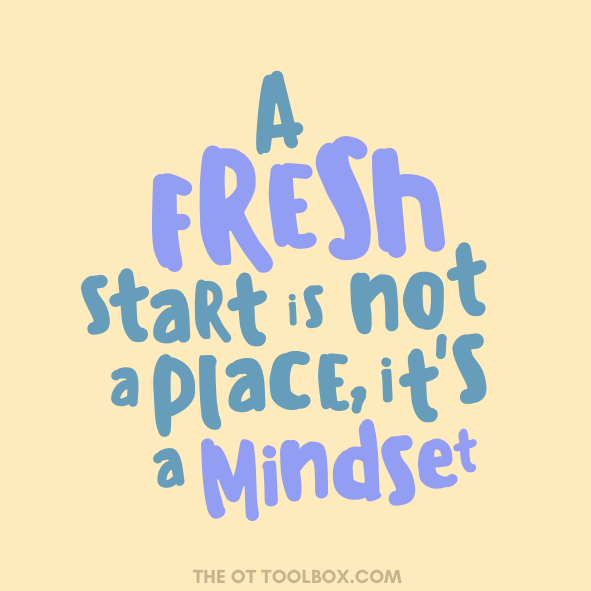
We can take a fresh start on offering play opportunities for our kids. Let’s expose them to the power of play!
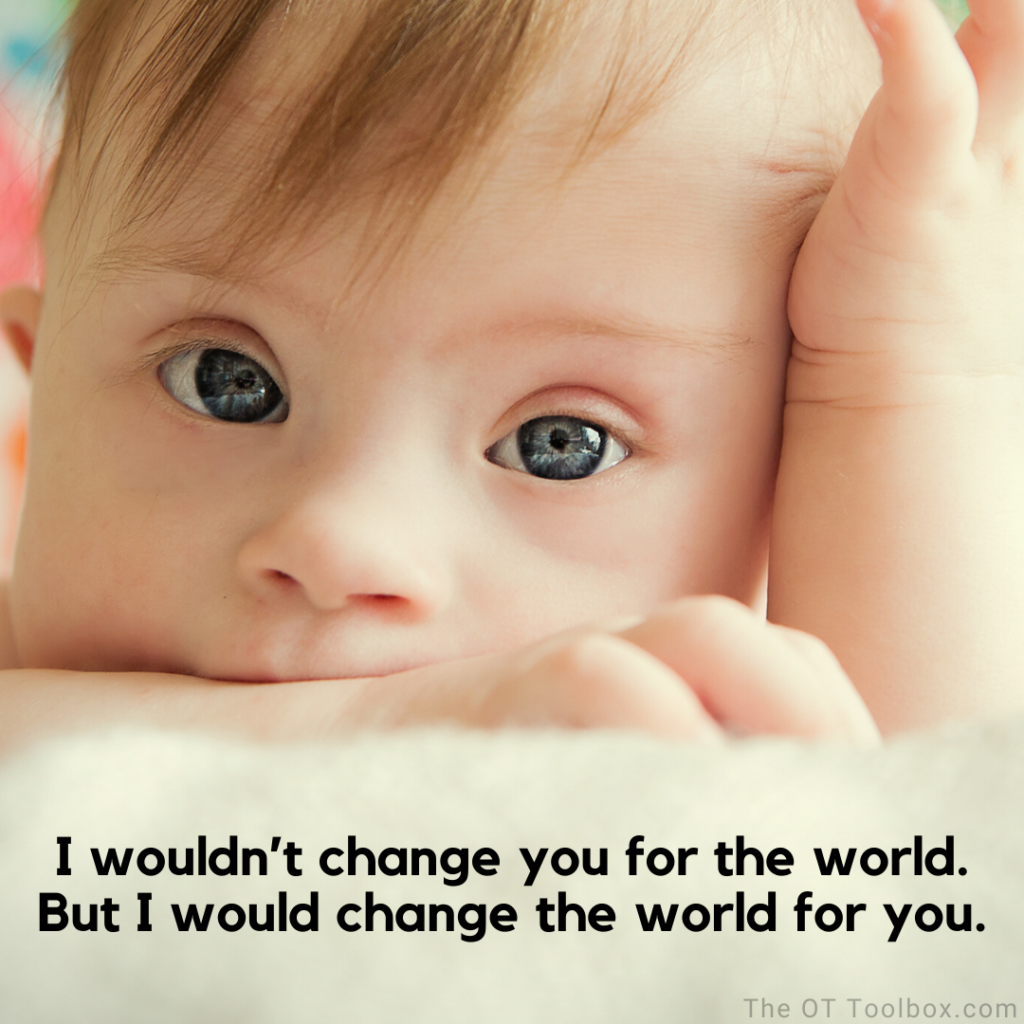
We as parents, educators, and therapy professionals have the opportunity to take a stand on making the power of play more powerful! Let’s change current practices of limited recess time, lack of outside play opportunities, and busyness! Let’s change the world and its expectations and perspectives so we can promote the power of play as a means for supporting child development.
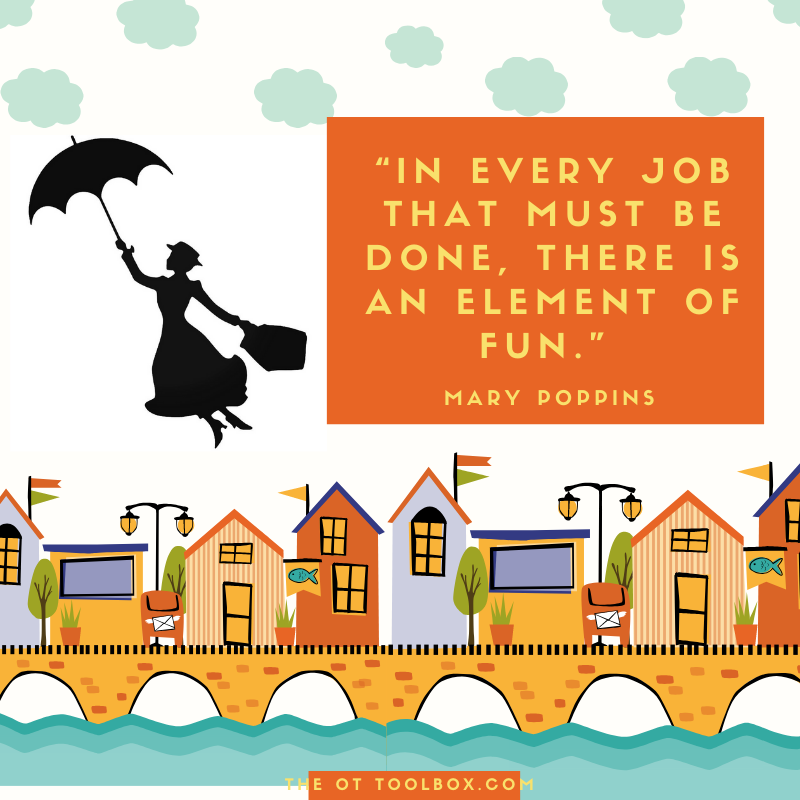
This quote from the Mary Poppins book and movies equates with the through of play being the work of the child, but it’s through play that development happens and is practiced. Not only can we play to support development, we can make the process therapeutic and fun! It’s all connected!
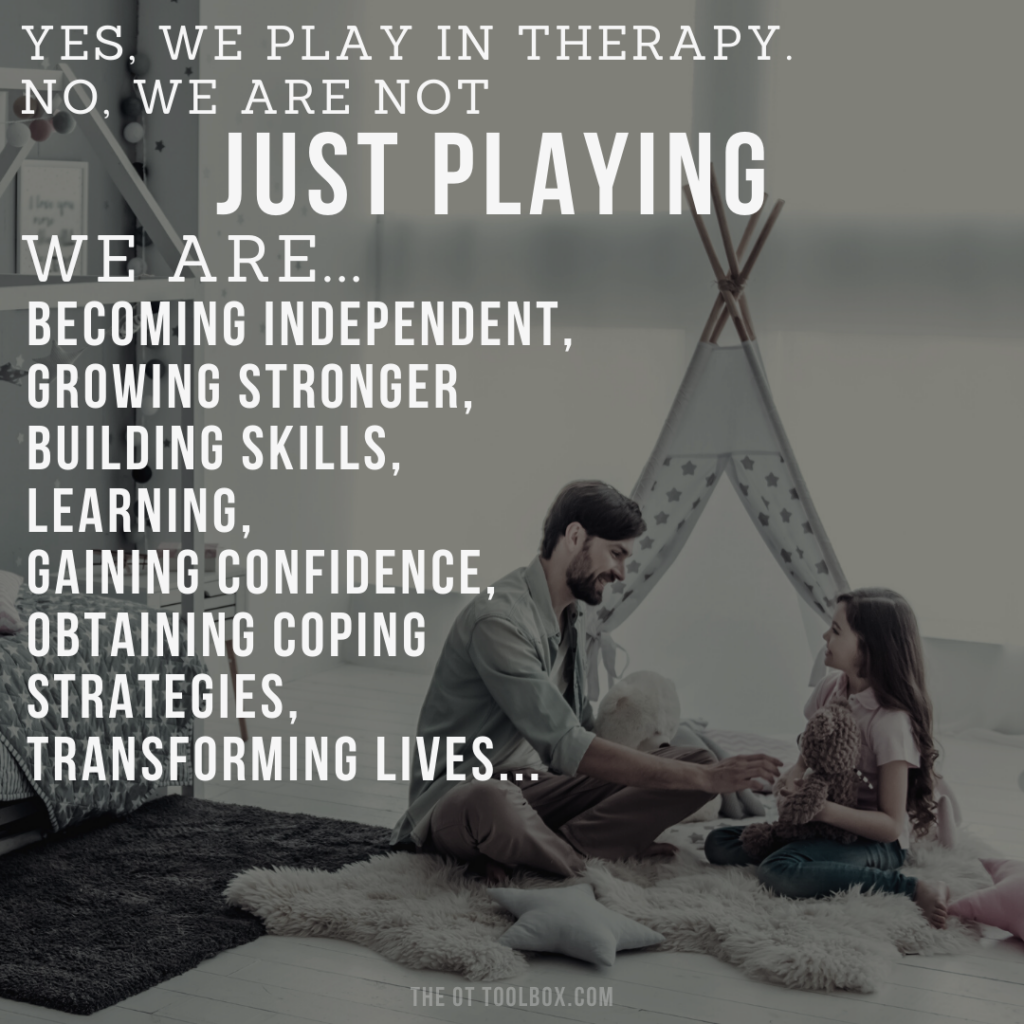
This play quote by Colleen Beck, OTR/L at The OT Toolbox shares why play is so powerful and benefits development in children. Play offers tools that a child will use throughout their lives.
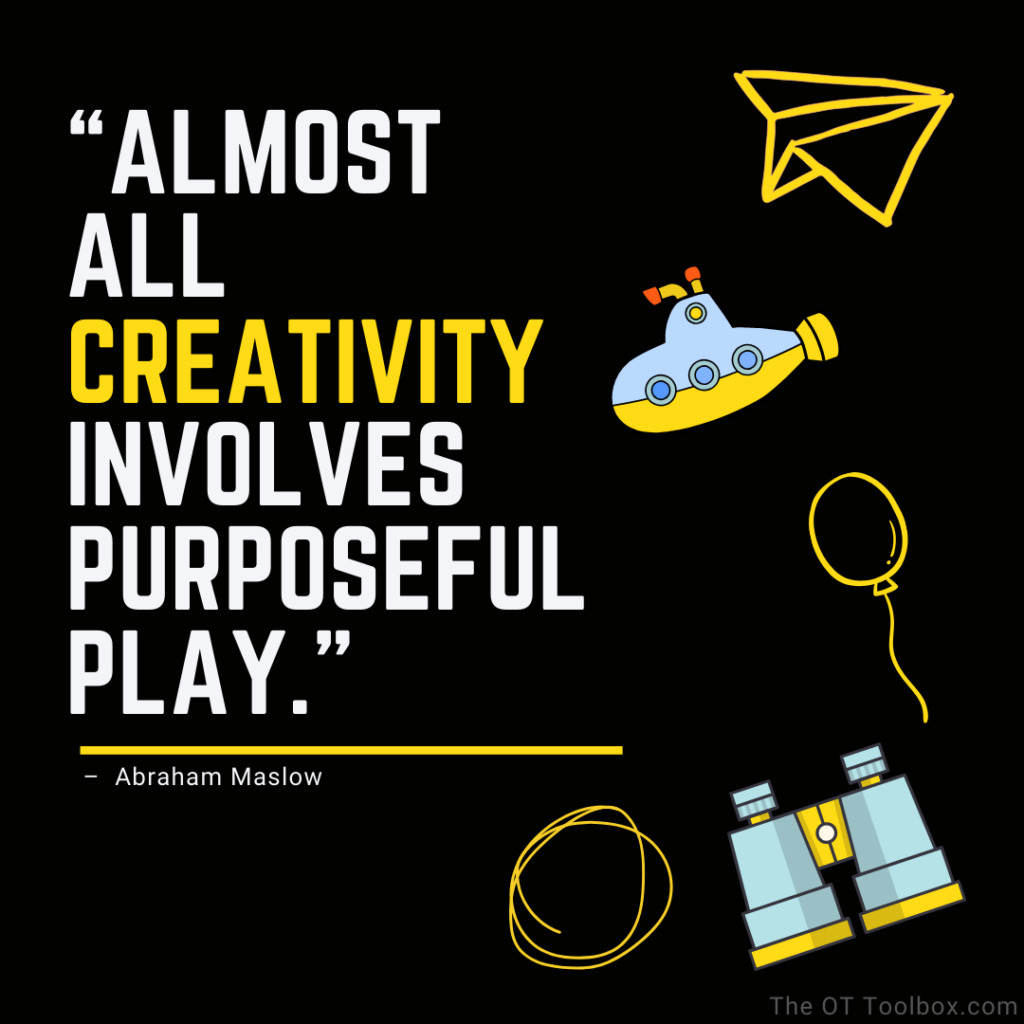
Creativity is play and play is creativity. Both are interconnected but also a way to support play development.
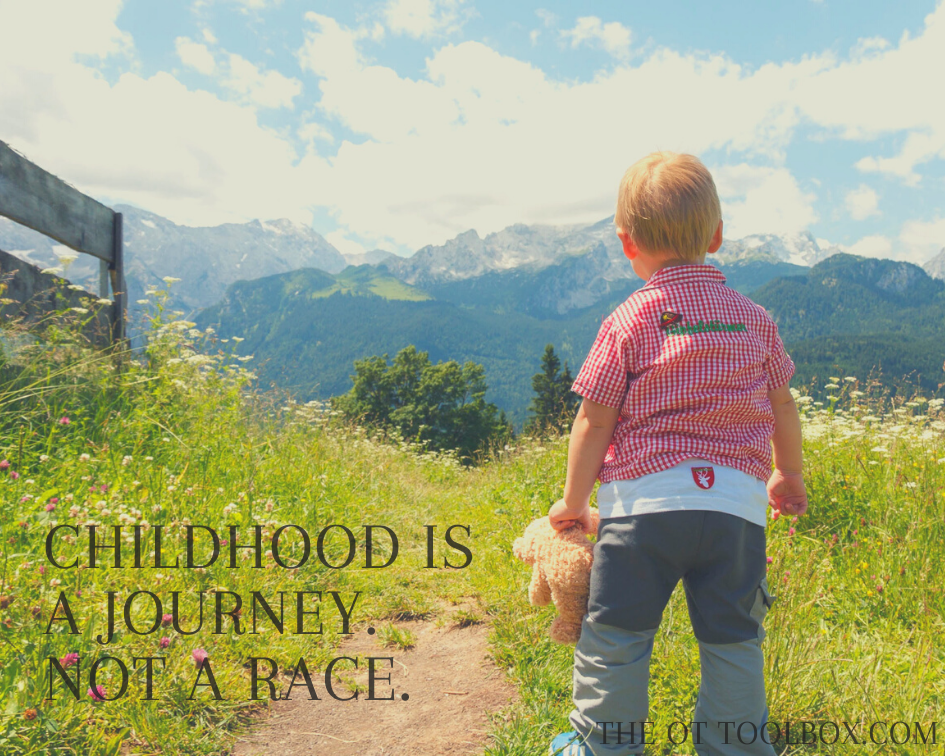
That childhood journey involves much development; cognitively, physically, emotionally…This is a process and it’s through play that the child has the opportunity to learn and practice essential skills.
Occupational therapy goals can be accomplished with various ball pit activities, and you’ll often see this therapy tool in OT clinics.
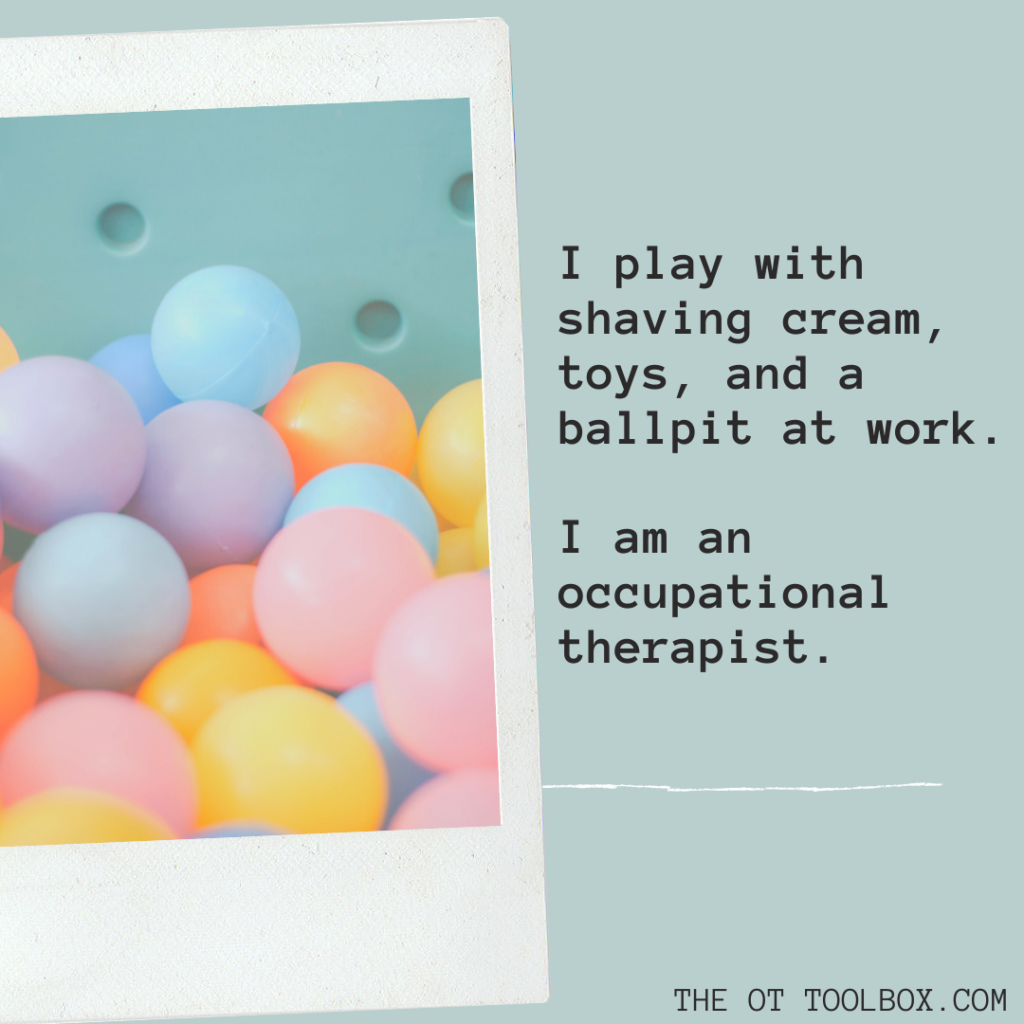
Play is the work of the child, and for the pediatric occupational therapist, play is a tool to support development.
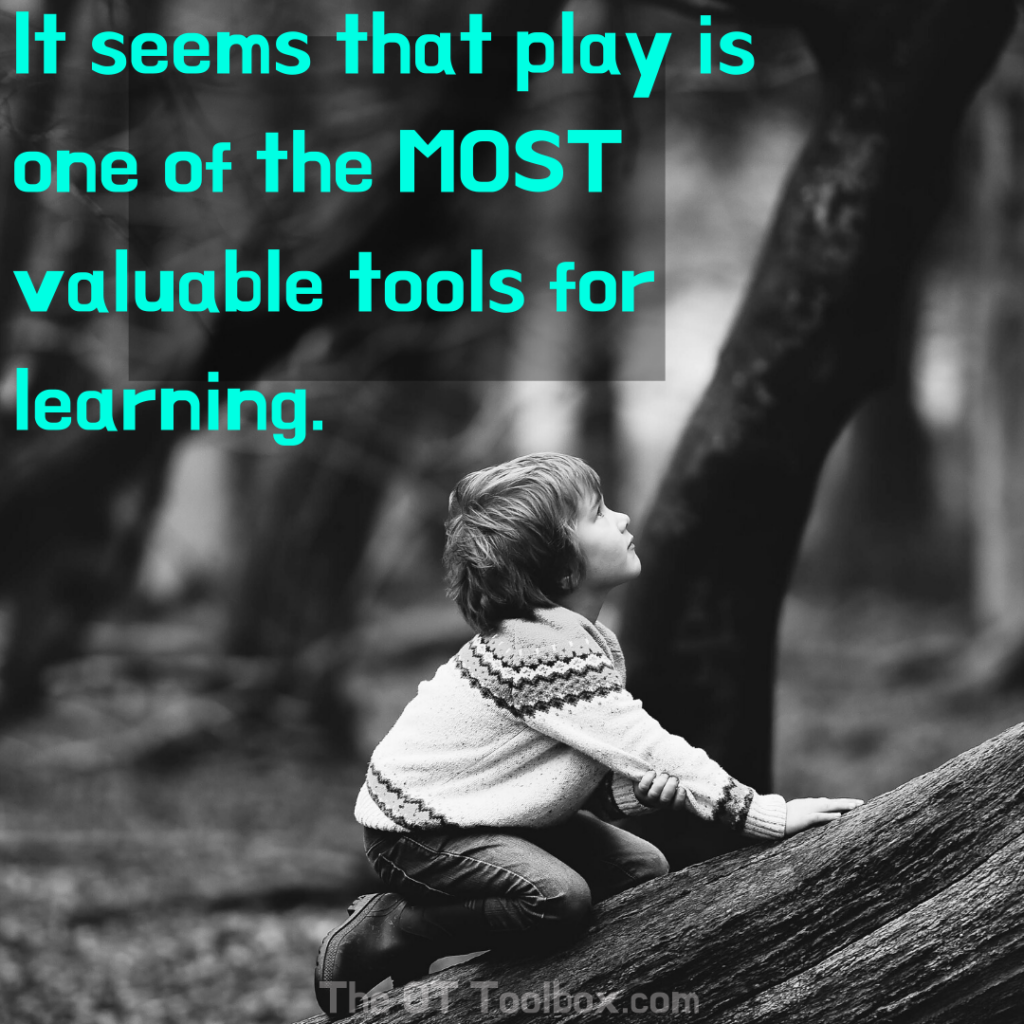
This is one of my favorites of the learning through play quotes. Learning happens through all aspects of play.
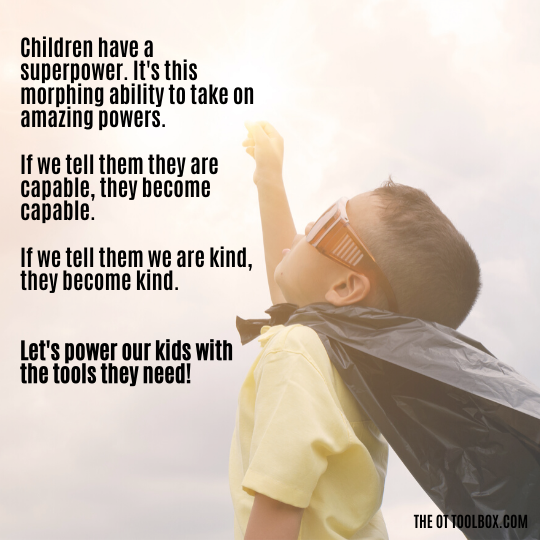
This play based learning quote is so powerful. We can support the development of kids through play and we can guide them to develop the skills they need!
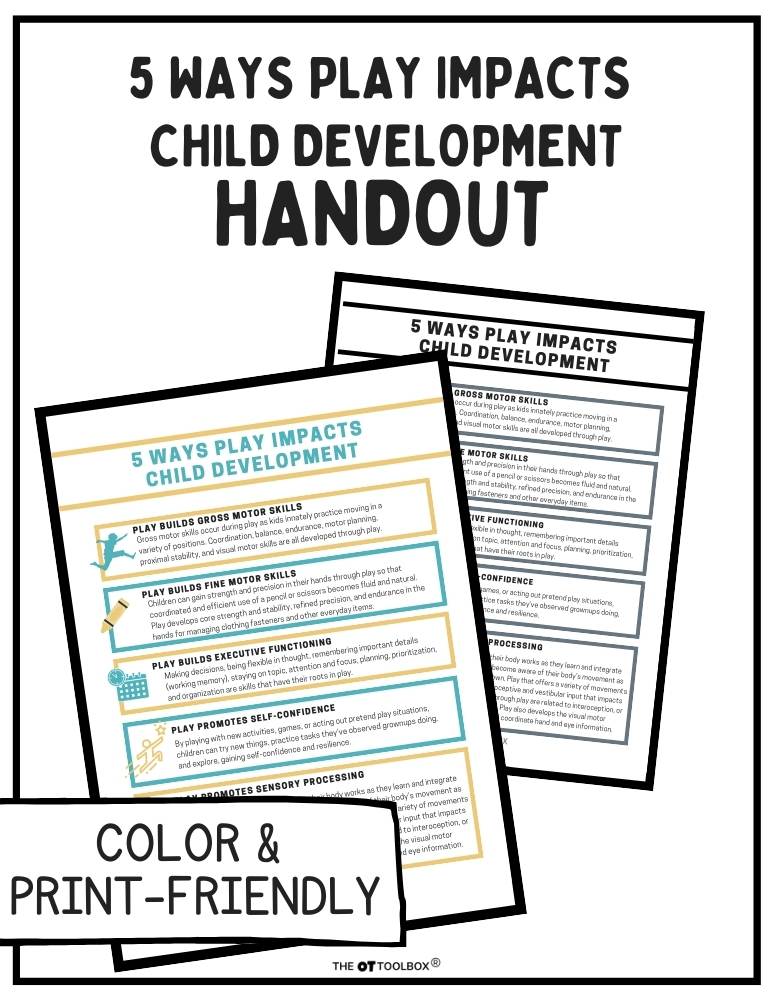
Free Handout on The Power of Play
Being that we as therapy professionals, teachers, or parents have this knowledge on play and child development, we can be advocates for our kids. Not only that, but by promoting play as a tool for child development, we serve other children as well. It’s an enormous ripple effect that has the power to impact a generation and generations following.
That’s why I wanted to put the information in this blog post into handout form.
Let’s share what we know about the power of play to teach others how play supports essential child development skills.
Print off this handout in either black and white, printer-friendly version or the color copy. They can be used as educational handouts to teach others on the power play has on child development skills.
To get your copy, just enter your email into the form below.
This handout set is also available in our OT Toolbox Member’s Club. Current Membership Club members can log into your account and head to the dashboard toolbox labeled “Educational Handouts“. Print off the handouts without the need to enter an email address.
Want to add this resource to your therapy toolbox so you can help kids thrive? Enter your email into the form below to access this printable tool.
This resource is just one of the many tools available in The OT Toolbox Member’s Club. Each month, members get instant access to downloadable activities, handouts, worksheets, and printable tools to support development. Members can log into their dashboard and access all of our free downloads in one place. Plus, you’ll find exclusive materials and premium level materials.
Level 1 members gain instant access to all of the downloads available on the site, without enter your email each time PLUS exclusive new resources each month.
Level 2 members get access to all of our downloads, exclusive new resources each month, PLUS additional, premium content each month: therapy kits, screening tools, games, therapy packets, and much more. AND, level 2 members get ad-free content across the entire OT Toolbox website.
Join the Member’s Club today!

Colleen Beck, OTR/L has been an occupational therapist since 2000, working in school-based, hand therapy, outpatient peds, EI, and SNF. Colleen created The OT Toolbox to inspire therapists, teachers, and parents with easy and fun tools to help children thrive. Read her story about going from an OT making $3/hour (after paying for kids’ childcare) to a full-time OT resource creator for millions of readers. Want to collaborate? Send an email to contact@theottoolbox.com.

